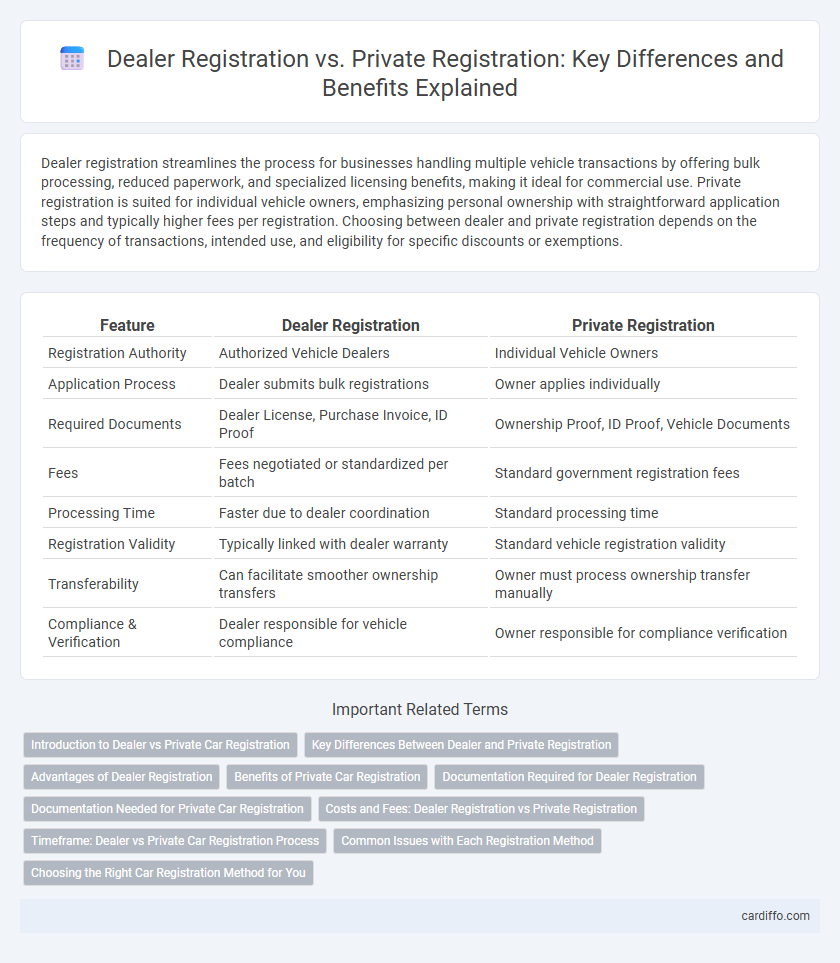Dealer registration streamlines the process for businesses handling multiple vehicle transactions by offering bulk processing, reduced paperwork, and specialized licensing benefits, making it ideal for commercial use. Private registration is suited for individual vehicle owners, emphasizing personal ownership with straightforward application steps and typically higher fees per registration. Choosing between dealer and private registration depends on the frequency of transactions, intended use, and eligibility for specific discounts or exemptions.
Table of Comparison
| Feature | Dealer Registration | Private Registration |
|---|---|---|
| Registration Authority | Authorized Vehicle Dealers | Individual Vehicle Owners |
| Application Process | Dealer submits bulk registrations | Owner applies individually |
| Required Documents | Dealer License, Purchase Invoice, ID Proof | Ownership Proof, ID Proof, Vehicle Documents |
| Fees | Fees negotiated or standardized per batch | Standard government registration fees |
| Processing Time | Faster due to dealer coordination | Standard processing time |
| Registration Validity | Typically linked with dealer warranty | Standard vehicle registration validity |
| Transferability | Can facilitate smoother ownership transfers | Owner must process ownership transfer manually |
| Compliance & Verification | Dealer responsible for vehicle compliance | Owner responsible for compliance verification |
Introduction to Dealer vs Private Car Registration
Dealer registration allows businesses to register multiple vehicles under a single entity, streamlining fleet management and resale processes. Private registration pertains to individual vehicle owners, requiring personal identification and limiting registrations to single vehicles. Understanding the differences in documentation, fees, and legal obligations helps ensure compliance and efficient vehicle management for both dealers and private individuals.
Key Differences Between Dealer and Private Registration
Dealer registration involves the process where licensed vehicle dealers register multiple vehicles under their business name, often benefiting from streamlined procedures and bulk processing advantages. Private registration is the individual owner's registration of a single vehicle, requiring personal documentation and typically involving standard fees and requirements. Key differences include eligibility criteria, processing times, and regulatory compliance, with dealer registration subject to stricter oversight and record-keeping mandates compared to private registrations.
Advantages of Dealer Registration
Dealer registration offers streamlined access to a wide inventory of vehicles, facilitating faster transactions and bulk purchases. It provides buyers with manufacturer-backed warranties and certified inspections, ensuring higher quality and reliability compared to private sales. Enhanced legal protections and financing options further distinguish dealer registration as a more secure and convenient process for vehicle acquisition.
Benefits of Private Car Registration
Private car registration offers enhanced privacy by keeping personal information confidential compared to dealer registration, which often involves sharing details with third-party sellers. It provides greater control over the vehicle's legal ownership process, reducing the risk of errors or disputes associated with dealer-managed registrations. This method also allows for more personalized management of tax payments and renewal schedules, ensuring compliance and convenience for individual vehicle owners.
Documentation Required for Dealer Registration
Dealer registration requires a comprehensive set of documents including a valid business license, proof of dealership ownership, dealership address verification, and a seller's permit or tax ID number. Additional documentation may include a surety bond, inventory reports, and manufacturer's authorization certificates to ensure compliance with regulatory standards. These requirements differ significantly from private registration, which primarily demands personal identification and vehicle ownership proof.
Documentation Needed for Private Car Registration
Private car registration requires specific documentation including proof of vehicle ownership such as a sales invoice or a transfer certificate, a valid identification document like a driver's license or passport, and proof of residence. Additional documents may include a roadworthiness certificate, insurance policy, and payment receipts for applicable taxes or fees. Unlike dealer registration, which involves bulk paperwork for multiple vehicles, private registration emphasizes individual ownership verification and compliance with local vehicle regulations.
Costs and Fees: Dealer Registration vs Private Registration
Dealer registration typically involves higher costs and fees compared to private registration due to licensing, bonding, and compliance requirements imposed by regulatory authorities. Private registration often incurs minimal expenses, primarily consisting of standard vehicle registration fees and taxes without the added dealer-specific charges. These financial differences impact overall affordability and are critical considerations when choosing between dealer and private vehicle registration options.
Timeframe: Dealer vs Private Car Registration Process
The timeframe for dealer registration typically ranges from 1 to 3 business days due to streamlined processing and pre-clearance of documents by dealerships. In contrast, private registration often takes 1 to 2 weeks, as individual applicants must submit all required paperwork and vehicle inspections independently. Efficient dealer registration reduces wait times, while private registration demands more time for verification and approval.
Common Issues with Each Registration Method
Dealer registration often faces issues such as incomplete documentation, incorrect tax information, and delays in title transfers, impacting the vehicle resale process. Private registration commonly encounters challenges like missing emissions certificates, unverifiable vehicle history, and discrepancies in ownership proof, leading to registration rejections or fines. Both methods require careful adherence to regulatory compliance and accurate submission of required documents to avoid processing delays.
Choosing the Right Car Registration Method for You
Choosing the right car registration method depends on your status as a buyer; dealer registration streamlines the process by handling paperwork and fees directly, offering convenience and reduced hassle. Private registration requires the buyer to individually manage documentation, payments, and compliance with local DMV requirements, which can be more time-consuming but offers greater control. Understanding the differences in cost, time, and legal responsibilities between dealer and private registration ensures an informed decision that aligns with your priorities and vehicle acquisition situation.
Dealer Registration vs Private Registration Infographic

 cardiffo.com
cardiffo.com